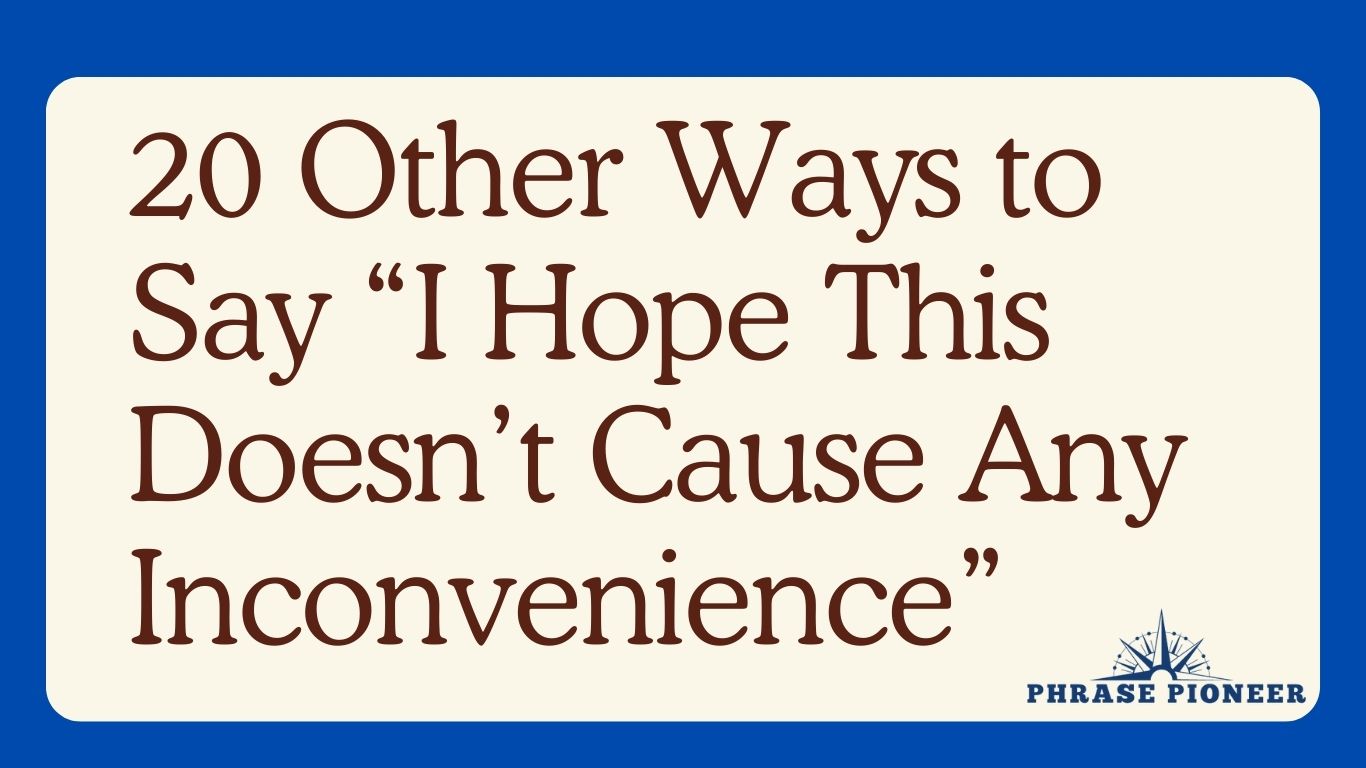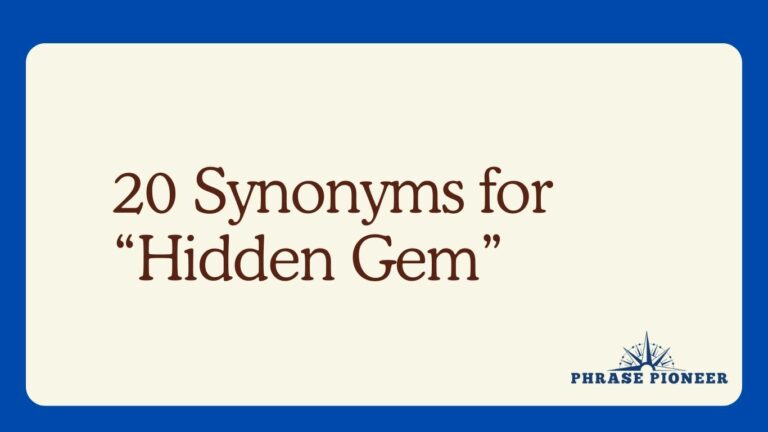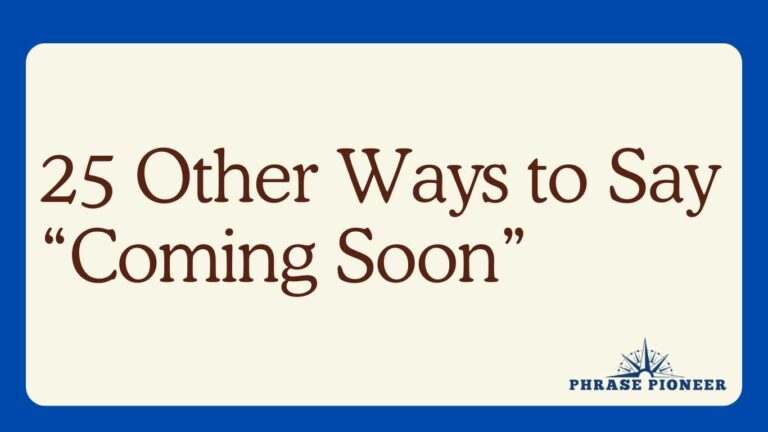20 Other Ways to Say “I Hope This Doesn’t Cause Any Inconvenience”
The expression “I hope this doesn’t cause any inconvenience” is often used to show politeness and consideration when a change or request might potentially trouble someone. To maintain good relations and communicate effectively in various contexts, you can use different phrases. Here are twenty alternatives, complete with example sentences and explanations.
Formal Variants
1. I trust this will not be too disruptive
- Example: “I trust this change in schedule will not be too disruptive to your plans.”
- Explanation: This is a formal way of expressing hope that a change will not negatively impact someone’s plans or routine.
2. My apologies for any trouble this may cause
- Example: “My apologies for any trouble this may cause to your workflow.”
- Explanation: When you anticipate that an action may cause inconvenience, this phrase directly expresses regret in a formal tone.
3. We appreciate your flexibility regarding this matter
- Example: “We appreciate your flexibility regarding the rescheduling of the meeting.”
- Explanation: It’s a formal request that acknowledges and thanks the affected person in advance for their understanding.
4. I would be grateful for your understanding
- Example: “I would be grateful for your understanding in regard to the project’s delayed completion.”
- Explanation: This phrase communicates a request for empathy from the other party, wrapped in a courteous package.
5. Your cooperation in this regard is highly valued
- Example: “Your cooperation in this matter is highly valued, should there be any inconveniences.”
- Explanation: It conveys recognition of the potential disturbance and expresses appreciation for the person’s assistance.
Semi-formal Variants
6. Please bear with us
- Example: “The system is currently down for maintenance—please bear with us.”
- Explanation: Common in customer service, this phrase asks the listener to be patient during a possibly inconvenient time.
7. Let’s hope for minimal disruption
- Example: “The office move is next week, let’s hope for minimal disruption to our routines.”
- Explanation: This phrase suggests a collective wish to avoid significant inconvenience.
8. Forgive any inconvenience
- Example: “The construction will continue through next month, so please forgive any inconvenience.”
- Explanation: An appeal for leniency and understanding if the situation causes any troubles.
9. I regret any disturbance this may cause
- Example: “I regret any disturbance the upcoming renovations may cause.”
- Explanation: A respectful expression of regret over potential inconvenience.
10. We seek your indulgence
- Example: “As we transition to a new software platform, we seek your indulgence should there be any hiccups.”
- Explanation: This semi-formal request asks for patience and forgiveness in advance.
Informal Variants
11. Hope it’s not too much of a hassle
- Example: “I moved our lunch to 2 PM, hope it’s not too much of a hassle for you.”
- Explanation: An easy-going way to express hope that a change does not inconvenience someone too greatly.
12. Sorry for the potential mix-up
- Example: “We’ve had to change the venue last minute—sorry for the potential mix-up.”
- Explanation: Usually used when there’s a risk of confusion or inconvenience, this phrase is a casual apology.
13. Don’t let this interrupt your day
- Example: “I’m dropping by your office later for the papers; don’t let this interrupt your day.”
- Explanation: A gentle reminder to avoid letting the interruption affect one’s routine, with an informal tone.
14. My bad if this messes with your plans
- Example: “I need to reschedule our game night—my bad if this messes with your plans.”
- Explanation: Using slang, this phrase offers an apology for potentially causing inconvenience.
15. Oops, hope this isn’t a bother
- Example: “Oops, I forgot to mention the deadline was moved up—hope this isn’t a bother.”
- Explanation: A light and colloquial way of expressing hope that an oversight doesn’t cause inconvenience.
Polite Variants
16. Thanks for bearing with this situation
- Example: “Thanks for bearing with this situation while we upgrade our system.”
- Explanation: It’s a polite way to thank someone in advance for their patience regarding a potentially inconvenient circumstance.
17. Your patience is appreciated
- Example: “Your patience is appreciated as we work to resolve this issue.”
- Explanation: A considerate acknowledgment of inconvenience while thanking for patience.
18. Your understanding is most kind
- Example: “Your understanding is most kind as we navigate these unforeseen delays.”
- Explanation: A gracious and refined way of thanking someone for their patience in the face of inconvenience.
19. I value your adaptability
- Example: “I value your adaptability in accommodating the new meeting time.”
- Explanation: This expression shows appreciation for the person’s ability to handle changes without mentioning inconvenience directly.
20. Please accept our sincerest apologies for any disruption
- Example: “Please accept our sincerest apologies for any disruption this may cause.”
- Explanation: It is a formal, heartfelt apology that recognizes the potential negative impact of an action or decision.
Conclusion
Communicating about an inconvenience with tact and thoughtfulness is key to maintaining positive relationships, whether personal or professional. The way you express this sentiment can significantly affect the response and goodwill on the other side. Each of the above variations is designed to suit different situations and audiences while still conveying respect and consideration.







